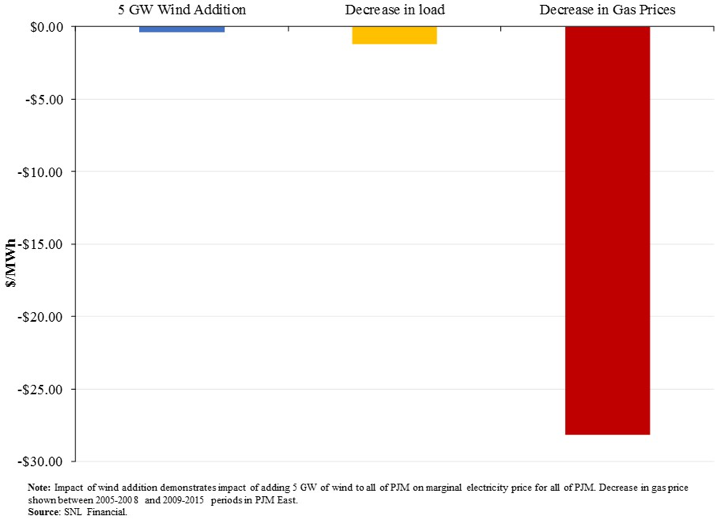
The news that DOE’s review of “critical issues” in the electric power system, which was expected the last week of June, would not be completed until July means that the Department – and Energy Secretary Rick Perry – would have at least one more week to consider the latest document submitted to inform the review. That would be the report produced by Analysis Group, and commissioned by AEE and AWEA, entitled Electricity Markets, Reliability, and the Evolving U.S. Power System. Its conclusion could not be more clear: “Recently, some have raised concerns that current electric market conditions may be undermining the financial viability of certain conventional power plant technologies (like existing coal and nuclear units) and thus jeopardizing electric system reliability. In addition, some point to federal and state policies supporting renewable energy as a primary cause of such impacts. The evidence does not support this view.”
The independent assessment by this leading consulting firm is the latest in a series of reports from AEE and other industry groups intended to steer DOE clear of misconceptions about our fast-changing power grid – and it is the most authoritative. Overall, the takeaway from Analysis Group’s report is consistent with prior submissions: It is the low price of natural gas, not state and federal policies supporting renewable energy, that is responsible for market pressures causing coal and nuclear power plants to retire, and the shift in resources is doing nothing to make the electric power system less reliable.
But Analysis Group goes one step further, saying that the changeover in generating resources is the expected result of market competition, which ultimately benefits consumers: “The retirement of aging resources is a natural element of efficient and competitive market forces, and where markets are performing well, these retirements mainly represent the efficient exit of uncompetitive assets, resulting in long-run consumer benefits.”
“The transformation now under way in the electric power system is driven primarily by market forces,” said Susan Tierney, senior advisor, Analysis Group, and one of the authors, along with Analysis Group Principal Paul Hibbard, commenting on release of the report. “Low natural gas prices, technology changes, and flat demand for electricity have been putting financial pressure on and leading to the retirement of older, less economic power plants. This is a natural consequence of market competition. The result is a more diverse set of energy resources on the grid that is being capably managed in a way that provides reliable electric power.”
AEE and AWEA commissioned the independent report by Analysis Group to answer questions posed by Secretary Perry in his April 14 memo directing DOE to produce, in 60 days, a review of “critical issues central to protecting the long-term reliability of the electric grid.” In the memo, Perry expressed concerns about the “erosion of critical baseload resources” due to “regulatory burdens introduced by previous administrations that were designed to decrease coal-fired power generation” as well as “market-distorting effects of federal subsidies that boost one form of energy at the expense of others.” He directed DOE specifically to examine “the extent to which continued regulatory burdens, as well as mandates and tax and subsidy policies, are responsible for forcing the premature retirement of baseload power plants.”
In addressing the Secretary’s stated concerns, Analysis Group offered these key findings:
- Market forces: Fundamental market forces – flat demand for electricity, low natural gas prices since the mid-2000s and the addition of significant amounts of highly efficient new gas-fired resources since 2000 – are primarily responsible for altering the profitability of many older, merchant generating assets in the parts of the country with organized wholesale competitive markets. These market fundamentals are producing savings for consumers.
- Lesser factors: Factors such as rapid growth in deployment of advanced energy technologies, and state policies supporting such technologies also contribute to reducing the profitability of less economic assets, but such factors are secondary to market fundamentals in causing financial pressure on merchant plants without long-term power contracts.
Relative Incremental Impact of Three Factors on Prices per MWh in PJM’s Wholesale Energy Market: Illustrative Impacts of Changes in Natural Gas Prices, Electricity Demand and Entry of Wind Resources

- Aging resources: The retirement of aging resources is a natural element of efficient and competitive market forces, and where markets are performing well, these retirements mainly represent the efficient exit of uncompetitive assets.
- Reliability benefits: Many advanced energy technologies can and do provide reliability benefits by increasing the diversity of the system and by providing important reliability services to the grid. The addition of newer, technologically advanced, and more efficient natural gas and renewable technologies is rendering the power systems in this country more, rather than less, diverse.
- “Baseload” an outdated term: Given the many attributes associated with a reliable electric system, the term "baseload resources" is an outdated term in today’s electric system which depends upon a wide variety of resources to provide essential reliability services and is seeing gas-fired resources and renewable capacity together providing both around-the-clock power and the flexibility to cycle and ramp as needed to meet and sustain bulk power system reliability objectives.
“The electricity system in the United States is stronger than it's ever been,” said AEE CEO Graham Richard, commenting on release of the report. “Thanks to innovation and smart policy, we have a more diverse fuel mix, a more reliable grid, and lower electricity costs. The Analysis Group report highlights how advanced energy technologies are helping to modernize the grid and how grid operators are well equipped to manage this market change. As DOE finalizes its report on reliability, we hope the Department will incorporate these key findings, which reflect the true state of the grid.”
